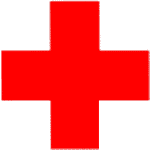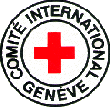|
THE PROTECTION OF THE
RED CROSS &
RED CRESCENT EMBLEMS

|
|


|
When placed against a white background,
the
Red
Cross and Red
Crescent
are two of the very few symbols which
are
immediately recognised by people throughout
the world.
Although originally created to identify
the medical services
of the armed forces and allow the protection
of the sick and wounded,
these emblems have come to represent the
impartial humanitarian assistance provided
to those who suffer.
However, the fact that a person, organisation,
or company
is involved in, or desires to be associated
with, humanitarian assistance,
does not entitle them to utilise the red
cross or red crescent in their endeavours.
The use of the emblems is governed by the
Geneva Conventions of 1949, their Additional
Protocols of 1977,
and the national legislation of the concerned
State.
|


|
|
The Protection of the Emblems
under the Geneva Conventions and the Additional Protocols
The provisions of the Geneva conventions and the Additional Protocols
establish that the red cross and red crescent are symbols protected by
international law. These provisions define the individuals and services
entitled to use the emblems and the purposes for which they may be employed.
Their
use is regulated at all times, during periods of peace as well as during
times of armed conflict. Any unauthorised use of the emblems is prohibited.
Generally, the use of the emblem can be authorised to protect the medical
services of the armed forces and, in war time, civilian hospitals. It is
also used by the National Red Cross or Red Crescent Societies, their International
Federation, and the International Committee of the Red Cross.
|
|
|
|
|
|
|
|
|
Domestic Measures to regulate
Emblem Usage and prevent abuse
The responsibility for authorising the use of the red cross or red crescent
emblems rests with the State, which must regulate their use consistent
with the terms of the Conventions and Protocols. In order to effectively
control the utilisation of the emblems, a State must adopt internal measures
establishing the following:
-
the identification and definition of the emblem(s) recognised and protected
-
the national authority with the competence to regulate the use of the emblems
-
those entities with permission to employ the emblems, and
-
the uses for which permission is authorised.
In addition, a State must enact national legislation prohibiting and punishing
the unauthorised use of the emblems at all times. This legislation must
apply to all forms of personal and commercial use and prohibit imitations
or designs capable of being mistaken for the red cross or red crescent.
It is fundamental that the measures to prevent abuse also apply to the
members of the armed forces. However, this may be established through the
processes of the State governing military discipline. The use of the emblems
to hide or shelter combatants or military equipment during armed conflict
(ie perfidious use) is a war crime. Lesser violations must also
be punished.
The prevention and repression of emblem abuse is not accomplished solely
by the adoption of penal or regulatory measures. A State should also undertake
to inform the public, business, and the medical community on the proper
utilisation of the emblems.
|
|
|
|
|
|
|
|
|
The Necessity of Protecting the Emblem
The Red Cross and Red Crescent are the symbols recognised and protected
by International Humanitarian Law. The adoption of domestic measures to
ensure their respect is a fundamental step in maintaining the impartiality
associated with the providing of humanitarian assistance. Consequently,
the care and protection of those receiving aid is enhanced. The failure
of a State to take the appropriate measures can lead to the misuse of the
emblems and lessen the respect and confidence which they enjoy. In addition,
the failure to suppress abuse during times of peace will contribute to
abuse during armed conflict. This will erode the protective value of the
emblems, endanger the lives of those legitimately entitled to employ them,
and interfere with the care and protection of civilians and combatants
alike. |
|
|
 |
|
|
Further Information Information
The International Committee of the Red
Cross (ICRC) has published a pamphlet explaining, in greater detail,
the meaning of the emblems and their proper use. In addition, the ICRC
has drafted a model law concerning their utilisation and protection. States
are free to adopt this law or use it as a basis or a guide when drafting
their own legislation. Copies of this information can be obtained by contacting
the ICRC or your National Red Cross or Red Crescent Society. |
|
|
|
|